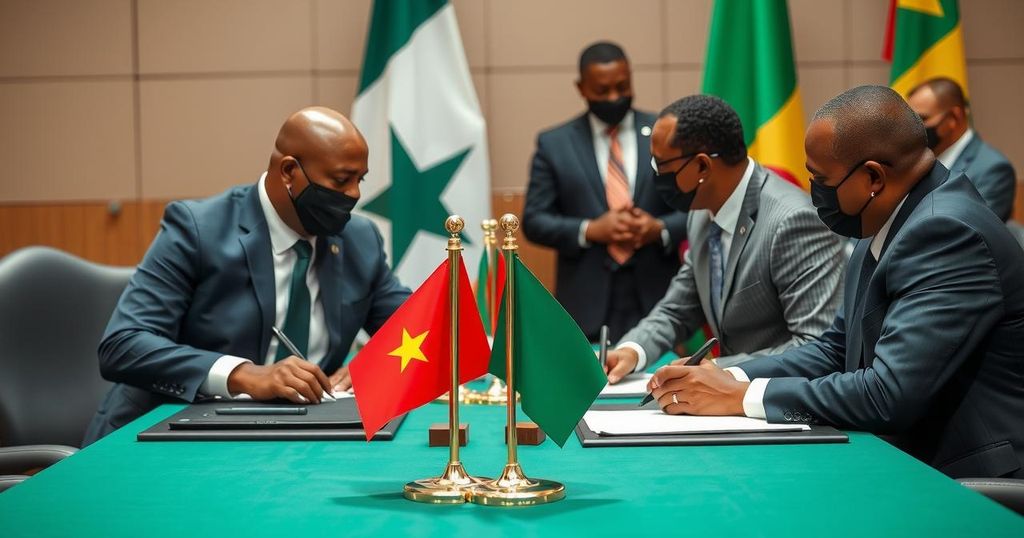AU Urges Urgent Action on Somalia-Ethiopia Agreement to Resolve Tensions

The African Union has urged Somalia and Ethiopia to quickly enact a significant agreement aimed at alleviating tensions related to Ethiopia’s desire for sea access. This follows Ethiopia’s recent contentious deal with Somaliland, which stirred conflicts over territorial sovereignty. The landmark agreement, brokered by Turkey, commits both countries to work collaboratively for mutual benefit and to address their disputes comprehensively in forthcoming discussions.
The African Union (AU) has called for both Somalia and Ethiopia to take immediate action on implementing a significant agreement designed to alleviate rising tensions regarding Ethiopia’s pursuit of access to the sea. AU Commission Chairman Moussa Faki Mahamat emphasized that this agreement is a vital step, underscoring the urgency for both nations to solidify this resolution without delay.
Tensions intensified earlier this year when Ethiopia entered into a contentious agreement with Somaliland, which is a self-proclaimed independent region of Somalia, to lease coastal areas for a new port and military base. This arrangement also suggested Ethiopia’s potential recognition of Somaliland’s independence, a move that Somalia strongly opposes, as it perceives this as an infringement on its sovereignty. The latest negotiations that led to this landmark agreement were facilitated by Turkey, culminating in a declaration announced by Turkish President Recep Tayyip Erdoğan. This historic accord signifies progress in granting Ethiopia, which has been landlocked since Eritrea’s secession in 1993, access to maritime resources.
The agreement, made public by Turkey, stipulates both countries’ commitments to address their differences and pursue a path toward shared prosperity. It includes provisions for initiating technical discussions focused on commercial and bilateral frameworks, ensuring Ethiopia’s access to sea routes will be “reliable, safe, and sustainable” under the sovereignty of Somalia. These discussions are anticipated to commence by February and conclude within a four-month timeframe, with Turkey poised to mediate if required.
Despite this progress, questions remain regarding the status of Ethiopia’s previous agreement with Somaliland, as a source close to the Somaliland administration indicated that the new accord does not invalidate the earlier memorandum of understanding. The AU and the Intergovernmental Authority on Development (IGAD) have endorsed this agreement as a significant leap toward resolving bilateral tensions. IGAD’s Executive Secretary, Workneh Gebeyehu, highlighted it as a testament to the commitment to amicable resolutions.
Somali President Hassan Sheikh Mohamud stressed the critical importance of fostering peace and partnership in the region, while Ethiopian Prime Minister Abiy Ahmed acknowledged his country’s requirement for coastal access but reiterated his refusal to consider military options. This agreement represents a pivotal moment in the relationship between Ethiopia and Somalia, though the lingering issues related to the deal with Somaliland pose a challenge for both nations to effectively transform this diplomatic success into actionable progress.
The recent tensions between Somalia and Ethiopia stem from Ethiopia’s efforts to secure access to the sea, which intensified following Ethiopia’s controversial agreement with Somaliland. Somaliland, which declared independence from Somalia, has become a focal point in the discussions, complicating the relationship between the two nations. This context is crucial in understanding why the recent AU-led agreement is significant and the challenges that remain regarding Somaliland’s status and the implications of Ethiopia’s earlier actions.
In conclusion, the African Union’s call for swift action on the newly established Somalia-Ethiopia agreement highlights the urgent need for cooperation between the two countries to mitigate tensions over coastal access. This landmark agreement signifies a positive step forward, yet the unresolved issues surrounding Ethiopia’s relationship with Somaliland require careful navigation. Both nations now face the critical task of transforming this diplomatic achievement into sustainable solutions for ongoing regional stability.
Original Source: newscentral.africa








